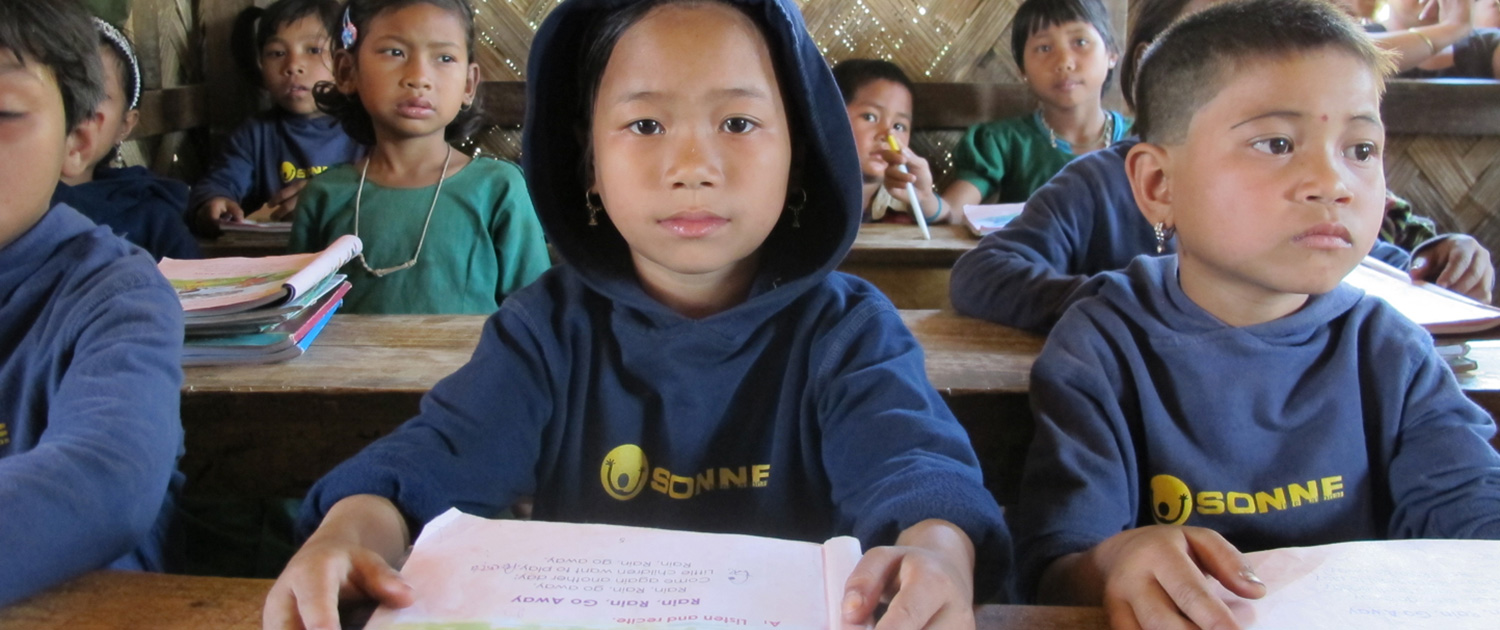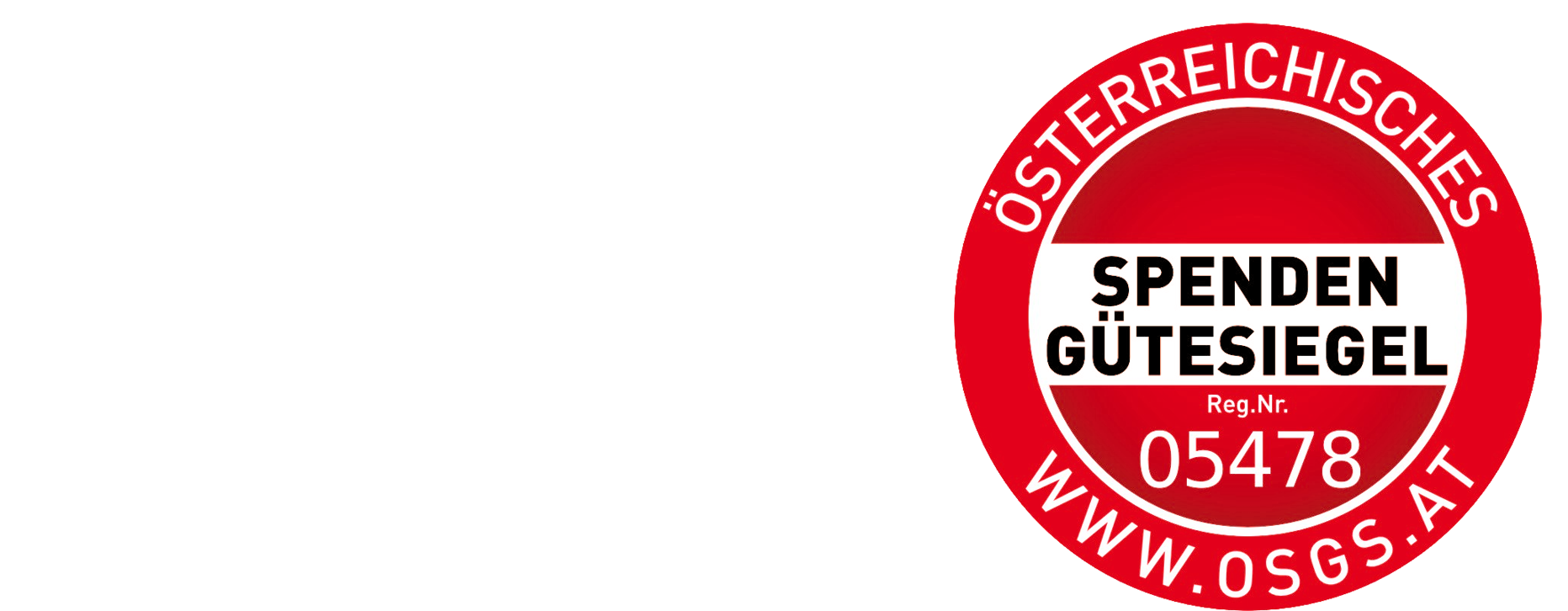Since the foundation of SONNE-International in 2002, Bangladesh has been one of the organization’s focus countries
Bangladesh is the world’s most densely populated state and one of the poorest countries on earth. The vast majority of the population live in extreme poverty. When Bangladesh hits the headlines, it is mainly with grave natural disasters (ever more frequent floods due to global warming) and the often scandalous working conditions in the country’s textile factories. Another major problem is the weakness of the infrastructure. Even the main roads are in an appalling state, and power blackouts occur several times a day and can last for hours.
In addition to the Bengal majority (>98%), who are mainly Muslim (>90%), ethnic minorities with a different cultural and religious provenance also live in Bangladesh. These minorities rank among our principal target groups.
The SONNE project areas are situated in the Chittagong Hill Tracts, in the Sherpur Region and in Cox’s Bazar District (Kutupalong refugee camp).
Chittagong Hill Tracts (CHT)
are a hilly area in the east of the country, on the border to Myanmar. They have been settled by members of twelve officially recognized Tibeto-Burmese minorities. Because of their secluded way of life and the cultural differences, they are grossly disadvantaged in comparison with the Bengal majority. This has repeatedly led to violent conflicts. The biggest challenges to be faced by these people are a blatant lack of infrastructure, poor access to education, training and health care and a very low average income.
Our projects in the CHT:
- SONNE village schools (9 primary schools, 1 secondary school)
- SONNE student hostel for further education in the regional capital Alikadam (child sponsorship project)
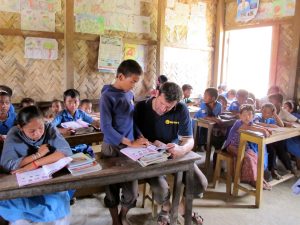
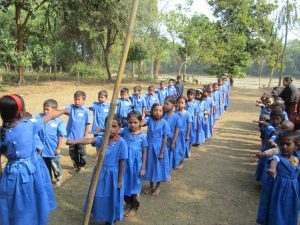
Jhenaigati Upazila, Sherpur
The north of Bangladesh, on the border to India, is populated by the Garo minority. Before the intervention of SONNE-International, their lack of integration (due to ethnic and religious differences) prevented the Garo children and adolescents of altogether eight villages from attending school. This low level of education is the main reason for the extreme poverty and the appalling living conditions of the local population (grossly insufficient health care, little or no access to the local labour market).
Our projects in Sherpur:
- SONNE village schools (8 primary schools, 1 secondary school)
- SONNE student hostel for further education (child sponsorship project) in the regional capital Jhenaigati
Kutupalong, Cox’s Bazar District
Kutupalong, Cox’s Bazar District, is currently the world’s largest refugee camp. It is inhabited by several hundred thousand Rohingya refugees that were forced to flee from ethnic and religious persecution in neighbouring Myanmar. Extreme overcrowding, inadequate nutrition, catastrophic hygiene conditions and lack of medical and educational infrastructure are just some of the problems that the camp’s inhabitants have to face. The population of the surrounding area is severely affected by the enormous influx of refugees, too.
Our projects in and around Kutupalong
- health station inside Kutupalong refugee camp (Camp No. 8) for ~50.000 refugees
- mobile health camp for the population of the surrounding area and for patients living in more remote villages
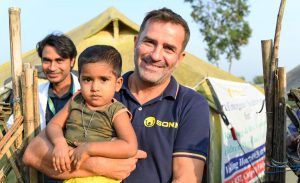
Education first
With its 17 village schools (9 in the Chittagong Hill Tracts, 8 in Sherpur) SONNE-International has been trying to get to the root of the problem. They provide primary education for ~1300 children from remote villages who had no chance of learning to read and write before.
Two secondary schools (also built and operated by SONNE-International), one in each of our project areas, opened their doors in 2016.
In the framework of a child sponsorship project, ~40 particularly talented and motivated students are given the opportunity to continue their studies. After finishing primary school they are accommodated in one of the two SONNE student hostels (in Alikadam, CHT, respectively in Jhenaigati, Sherpur) so that they can continue their education at a state-run higher school in town. Our most successful students are in due course given the possibility to continue their studies at a college and/or University in Dhaka, where we operate another SONNE hostel.
Sustainability is what matters
Apart from education, we focus on professional training (particularly computer training and tailoring) and income-generating activities, basic health care, access to clean drinking water and sanitary installations (latrines).
As our main objective is to generate long-lasting structures and thus sustainable improvements of our beneficiaries’ living conditions, all our projects are conducted in close cooperation with the local population.
Inter-regional SONNE projects in Bangladesh
- Computer training for adolescents in Alikadam and Jhenaigati
- Advancement of women: skills training (tailoring) in Alikadam, Jhenaigati and Dhaka
- Student hostel (for High School and University students) in the capital Dhaka


